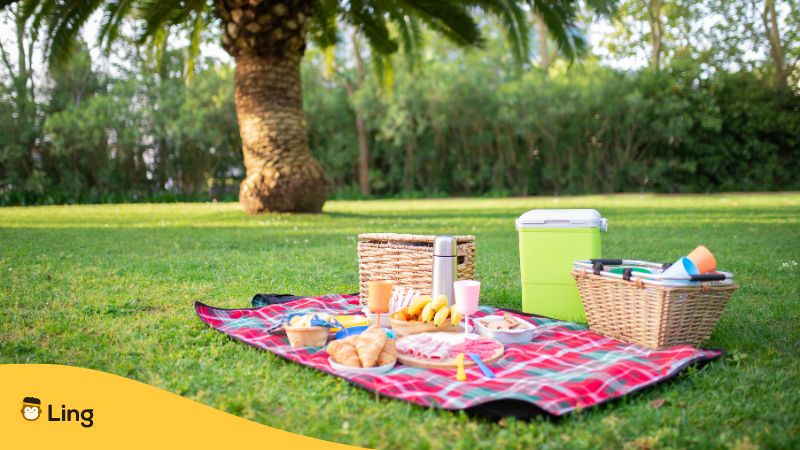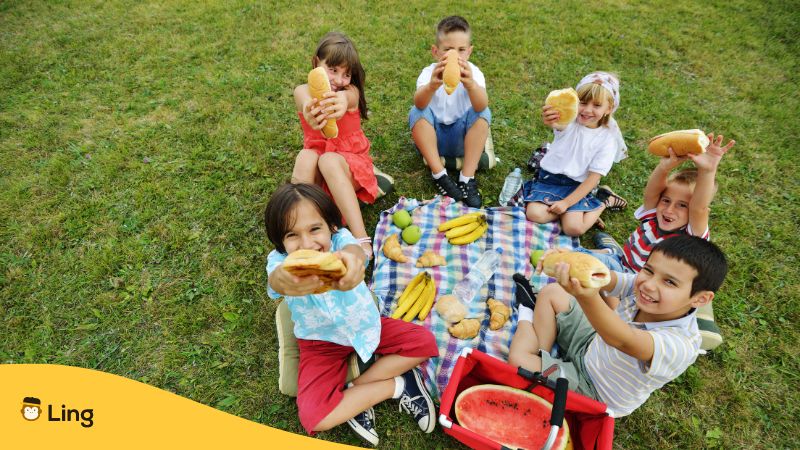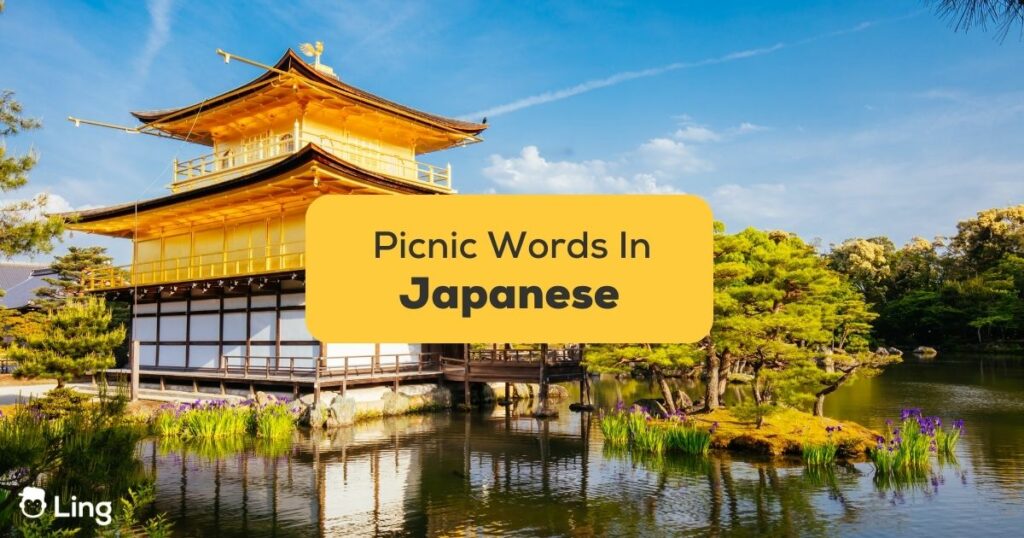Planning to visit a Kōen (こうえん) this year? In this post, we will be exploring the captivating world of Japanese words for picnic while diving into delicious cultural nuances. So, whether you’re a grammar fiend seeking a tasty new challenge or a picnic enthusiast enticed by the vibrant flavors of Japan, gear up for a journey that promises to be as informative as it is mouthwatering.
From dreamy cherry blossoms to the magic of tatami mats, the Japanese picnic experience is too enriching to pass up. And as we venture further into this world, we’ll unravel an ensemble of beautiful terms and phrases that imbibe Japan into our lingual (and culinary) map. Are you ready to tickle your brain cells while savoring succulent sushi bites in your mind? Read on to fuel your wanderlust and your appetite simultaneously!
Do Japanese People Like Going On Picnics?
Can a koi fish swim upstream? The answer is a resounding “Yes!” and so is the response to our question, “Do Japanese people like going on picnics?” In fact, Japan’s passion for picnics, or ピクニック (pikunikku), is almost legendary!
With Japan’s four clearly marked seasons, each offering its unique charm, picnicking is an eagerly anticipated and thoroughly enjoyed activity all year round. Cherry blossom viewing parties known as hanami in spring, among other seasonal outings, have picnics at their heart. These events are so vibrant and so jovial they make even the hardiest of hermit crabs consider venturing out!
Picnics in Japan are more than just eating outdoors; they are an art form and a cherished tradition. Japanese people seem to retain the child-like wonder of finding joy in the simplest things – like a well-packed bento box (べんとう) or the rustle of leaves under a shizen (しぜん) or natural canopy. And the fūka ( ふうけい ), or picturesque scenery? Icing on the cake!
So, do Japanese people like going on picnics? Without a doubt, yes! But it’s more than that – picnics are interwoven into Japanese culture’s beautiful tapestry. They are rhythms to the melody that is Japan’s heartfelt ode to nature and community bonding. So, don’t just ask, “Do Japanese people like going on picnics?” ask, “How much do they love it!” You might just be surprised by the adoration packed into the answer.

Japanese Words For Picnic Food
Now that we’ve whetted your linguistic appetite with the picnicking culture in Japan, let’s tantalize your taste buds with a gourmet line-up of food vocabulary. Imagine your bento box unfolds to finish off this feast for the senses! Paired with their delightful hiragana counterparts, these words promise to be true treats for language enthusiasts and foodies alike.
1. Onigiri (おにぎり)
First up, the quintessential picnic staple, onigiri or rice ball. Filled with a variety of delights from pickled plum (ume) to salty salmon (sake), onigiri is the sushi you can hold in your hand. A symbol of motherly love as these are often hand-molded, onigiri can be both heartwarming and filling!
2. Tamagoyaki (たまごやき)
Next on our plate, we have tamagoyaki, a sweet and succulent Japanese rolled omelet. Often found in bento boxes, this dash of sunshine-yellow adds a lovely contrast to your meal, not to mention a protein punch!
3. Karaage (からあげ)
Say hello to Japan’s answer to fried chicken — the irresistible karaage! Moist, tender chicken marinated in soy sauce, ginger, and garlic, coated in potato starch, and fried to a golden brown, karaage is the pinch of comfort food your picnic spread needs.
4. Edamame (えだまめ)
Don’t forget your greens! Edamame, or boiled green soybeans, are not only healthy but also incredibly addicting. They make a fun, interactive snack that perfectly balances the richness of the other pikunikku food.
5. Anpan (あんぱん)
And finally, to finish on a sweet note, savor a bite or two of the anpan, a sweet roll filled with anko or red bean paste. This darling of Japanese bakeries might just become your new favorite dessert.
6. Yakitori (やきとり)
Ever experienced the yum-factor of skewered delights? If not, let yakitori introduce you to the joy. A popular street food, yakitori, interpreted as “grilled chicken,” includes various types of skewered meat and veggies. From barbecued bites to your language arsenal, ‘yakitori’ is a Japanese must-have in every sense!
7. Maki Sushi (まきずし)
One could argue that nothing yells ‘Japan’ louder than sushi, and maki-zushi is sure to make your picnic a gastronomic festival. These are sushi rolls wrapped in seaweed, with an array of delicious fillings waiting to surprise you. Easy to handle and oh-so-pleasing to the palate, maki-zushi is love rolled into bite-sized delights!
8. Dango (だんご)
A traditional sweet treat, Dango is a skewer of chewy rice dumplings often smothered in a sweet soy glaze. Resembling miniature snowmen, these cute treats are not only a joy to the eyes but are also delightfully yummy. Brace yourself! A dango invasion is bound to leave your heart and stomach smitten.

Other Japanese Words For Picnic
Just when you thought you had picnicking in Japan all figured out, we’re here to unfold another layer of intrigue. In Japan, picnics aren’t just picnics — they come in various styles, celebrated for multiple reasons, and of course, involve a cluster of fascinating vocabulary. Let’s dive into the overflowing linguistic picnic basket Japan has to offer:
| English | Japanese Hiragana | Japanese Pronunciation |
|---|---|---|
| Picnic | ピクニック | Pikunikku |
| Picnic Basket | ピクニックバスケット | Pikunikku Basuketto |
| Picnic Table | ピクニックテーブル | Pikunikku Tēburu |
| Blanket | 毛布 | Mōfu |
| Sandwich | サンドイッチ | Sandoitchi |
| Juice | ジュース | Jūsu |
| Snacks | スナック | Sunakku |
| Fruits | フルーツ | Furūtsu |
| Water Bottle | 水筒 | Suitō |
| Napkins | ナプキン | Napukin |
| Utensils | 食器 | Shokki |
| Fork | フォーク | Fōku |
| Spoon | スプーン | Supūn |
| Knife | ナイフ | Naifu |
| Plate | 皿 | Sara |
| Cup | カップ | Kappu |
| Cooler | クーラーボックス | Kūrābokkusu |
| Sunscreen | 日焼け止め | Hiyakedome |
| Hat | 帽子 | Bōshi |
| Sunglasses | サングラス | Sangurasu |
Learn Japanese With Ling
Well, we’ve walked you through the Japanese words related to picnics and had a gastronomical romp. But, as they say, the flavor of the pudding lies in the eating. It’s time for you, dear reader, to take this inviting smorgasbord of words and flavors and bring it to life!
Why not try making your own onigiri or organizing a hanami party in your backyard? Or better yet, plan your own pikunikku using the rich vocabulary we’ve explored together. We bet nothing will make your Japanese experience more authentic.
Remember, language learning is a journey best enjoyed with a splash of fun. What’s more fun than a picnic that tickles your taste buds while expanding your language skills?
With that thought, we’d like to leave you in the capable hands of Ling. It’s a language-learning app that can take your language learning a notch higher, turning you from a casual picnicker to a linguistic gourmet. Ready for the next adventure with Ling? Download it today for FREE from the App Store or Play Store today!



































































